Pope Francis and “Ideological Colonization”
Our Holy Father Pope Francis has once again surprised the media (this is just one example) with a brief and frank comment about gender ideology. This comment was made during an open discussion with the Polish bishops during the pope’s trip for World Youth Day.
The comment was in response to a question about migrants and is as follows:
I would like to conclude with this aspect, since behind all this there are ideologies. In Europe, America, Latin America, Africa, and in some countries of Asia, there are genuine forms of ideological colonization taking place. And one of these – I will call it clearly by its name – is [the ideology of] “gender”. Today children – children! – are taught in school that everyone can choose his or her sex. Why are they teaching this? Because the books are provided by the persons and institutions that give you money. These forms of ideological colonization are also supported by influential countries. And this terrible!
In a conversation with Pope Benedict, who is in good health and very perceptive, he said to me: “Holiness, this is the age of sin against God the Creator”. He is very perceptive. God created man and woman; God created the world in a certain way… and we are doing the exact opposite. God gave us things in a “raw” state, so that we could shape a culture; and then with this culture, we are shaping things that bring us back to the “raw” state! Pope Benedict’s observation should make us think. “This is the age of sin against God the Creator”. That will help us.
One might ask, how is what the pope said such a surprise?
Pope Francis has commented a number of times on the “ideology of gender” and even the “ideological colonization” that attacks the family. (See, for example, Amoris Laetitia, no. 56; his Meeting with Families in Manila on January 16, 2015; his Address in Naples on March 23, 2015; his General Audience on April 15, 2015; his Address to the bishops of Puerto Rico on June 8, 2015; and his Address to Équipes de Notre Dame on September 10, 2015.)
This is in addition to the numerous times that the Holy Father has insisted (reflecting the Catechism of the Catholic Church, nos. 2333 and 2393) that all men and women are called to accept their sexual identities (see Amoris Laetitia, nos. 285-286 ; Laudato si’ no. 155) and that the family, based on the marriage between one man and one woman, is essential for children’s development (see, for example, Lumen Fidei, no. 52; Address to the Bishops of Malawi, November 6, 2014; Address to the International Catholic Child Bureau, April 11, 2014; Message for the 49th World Communications Day, January 23, 2015; and Welcome Ceremony in La Paz, Bolivia, July 8, 2015).
Does this mean that the pope is somehow out-of-step with his own declarations about the mercy of God and the abundance of love that God has for each person? Surely not. In fact, these assertions by the Holy Father are no doubt uttered with profound love for those who are harmed by the confusion and pain that gender ideology causes. For if we are created by the loving God as male and female, then we will not find happiness or fulfillment by rejecting this fundamental fact of our existence. Out of love, then, Pope Francis points out the errors in gender ideology and encourages bishops and all Catholics to do the same.
Archive
Intern Post: Reflection on The Spirituality of Marriage and the Family from Amoris Laetitia
Many of my friends who grew up in nominally Catholic households have lamented to me that their family home lacked the richness of the faith that they later came to know through their own practice and study. They went to Mass and Sunday school as kids, maybe said grace before meals or a little bedtime prayer, but otherwise their families didn’t live in a distinctively Catholic way. In hindsight, these young adults consider themselves impoverished by an upbringing that was essentially secular, and they intend for their own marriages and families to have a deeply Catholic character. They prioritize the sacraments, strong catechesis, spiritual and corporal works of mercy, awareness of the liturgical calendar, balancing penance and celebration, and hospitality. Living those things out seems like a daunting task because they are not inheriting a tradition from their families so much as trying to create a new one in the wake of a cultural shift that undermines their efforts.
In the ninth chapter of Amoris Laetitia, Pope Francis offers us some ideas about what Catholic family life can look like. He cites Vatican II, saying that lay spirituality “will take its particular character from the circumstances of… married and family life,” (313). He says, “The spirituality of family love is made up of thousands of small but real gestures,” (315). Through the next several paragraphs he specifically mentions family prayer, supporting one another, caring for one another, showing mercy, giving complete attention to others, and welcoming those outside the family with hospitality. These suggestions are not simply lifestyle choices, take ‘em or leave ‘em. Rather, these concrete actions reflect the life of Christ himself who is present in the family through the grace given to every baptized person and especially through the real graces of the sacrament of marriage.
With all this talk about marriage and family, it might be tempting for those of us who are unmarried to ignore the Church’s advice because it seems irrelevant to this moment in our lives. However, even as a single person, the Pope’s words about marriage are meaningful because they help me to prepare my heart for the marriage the Lord wants for me, instead of the woefully inadequate “Hollywood” version that has been so culturally ingrained. It is tempting to imagine that finding a spouse will tie up all the loose ends in my life and, like the movies, the credits will roll and we’ll live happily ever after. But the Pope warns us all that spouses need “a certain ‘disillusionment’ with regard to one another,” (320) and I think the same can be said of those who are looking for a spouse. I can’t expect another person to fulfill me completely. I am taking to heart his note about “spiritual realism” and the warning that “one spouse not presume that the other can completely satisfy his or her needs,” (320) which is a message that is desperately needed by those of us immersed in popular culture. Additionally, the “small but real gestures” that characterize the spirituality of the family can be practiced by anyone anywhere. For example, we are all called to practice the corporal and spiritual works of mercy, but “feed the hungry” takes on a new urgency when “the hungry” is a distraught 2-year-old tugging on your shirt. Likewise, to “bear wrongs patiently” is practically a heroic virtue when you have to bear the wrong of a sibling who has no remorse and will likely wrong you again. Within our families we have abundant opportunities to practice the virtues that sanctify us and open us to deeper union with the Lord.
When my friends describe what they hope to give their families they usually have specific ideas about praying the rosary as a family or being involved in ongoing community service and the like. However, they usually find a way to express that what they mean when they describe various devotions and practices is that they want their whole lives to be ordered toward the mystery of God’s love. The specific actions are expressions of a real desire to know, love, and serve the Lord. Pope Francis says that “spirituality becomes incarnate in the communion of the family,” (316). As Jesus’ day-to-day life was ordered to the will of the Father, so too the family is called to live their daily lives for Him.
Archive
AL Bootcamp: Final 3 Days!
June 6
“Love endures all things” (1 Cor 13:7).
Pope Francis: “In family life, we need to cultivate that strength of love which can help us fight every evil threatening it” (Amoris Laetitia, no. 119).
What is an evil that is threatening your family today? This may be from within (resentment, exhaustion, sin) or without (technology, entertainment, financial hardship). How are you fighting it?
June 7
“Love endures all things” (1 Cor 13:7).
Pope Francis: “I am sometimes amazed to see men or women who have had to separate from their spouse for their own protection, yet, because of their enduring conjugal love, still try to help them, even by enlisting others, in their moments of illness, suffering or trial. Here too we see a love that never gives up” (Amoris Laetitia, no. 119).
Do you know anyone in the situation that Pope Francis mentions here? Reach out to give that family a hand. If you do not know anyone personally, consider a donation to a domestic violence ministry.
June 8
“Love never fails” (1 Cor 13:8).
This is the conclusion of the AL Challenge. Did you make it through? Share your stories via Facebook.
Archive
AL Bootcamp: Week 4
May 16
“You hypocrite, remove the wooden beam from your eye first; then you will see clearly to remove the splinter from your brother’s eye” (Mt 7:5).
Pope Francis: “The Gospel tells us to look to the log in our own eye (cf. Mt 7:5). Christians cannot ignore the persistent admonition of God’s word not to nurture anger: ‘Do not be overcome by evil’ (Rm 12:21). ‘Let us not grow weary in doing good’ (Gal 6:9). It is one thing to sense a sudden surge of hostility and another to give into it, letting it take root in our hearts: ‘Be angry but do not sin; do not let the sun go down on your anger’ (Eph 4:26)” (Amoris Laetitia, no. 104).
Meditate on one of these Scripture passages today. Try to repeat it to yourself throughout the day, especially when you are tempted to anger.
May 17
“Be angry but do not sin; do not let the sun go down on your anger” (Eph 4:26).
Pope Francis: “My advice is never to let the day end without making peace in the family. ‘And how am I going to make peace? By getting down on my knees? No! Just by a small gesture, a little something, and harmony within your family will be restored. Just a little caress, no words are necessary. But do not let the day end without making peace in your family’. Our first reaction when we are annoyed should be one of heartfelt blessing, asking God to bless, free and heal that person” (Amoris Laetitia, no. 104).
Tonight, think over your day and your relationships with your family. Figure out if there’s anyone you should apologize to before bed, and do it.
May 18
“Love does not brood over injury” (1 Cor 13:5).
Pope Francis: “Once we allow ill will to take root in our hearts, it leads to deep resentment. The phrase ou logízetai to kakón means that love ‘takes no account of evil’; ‘it is not resentful’. The opposite of resentment is forgiveness, which is rooted in a positive attitude that seeks to understand other people’s weaknesses and to excuse them… Something is wrong when we see every problem as equally serious; in this way, we risk being unduly harsh with the failings of others” (Amoris Laetitia, no. 105).
Today, pay attention to whether you are falling into the trap of making much out of little. As the well-known book holds, “Don’t sweat the small stuff.” Think about your grievances in light of eternity.
May 19
“Father, forgive them, they know not what they do” (Lk 23:34).
Pope Francis: “Today we recognize that being able to forgive others implies the liberating experience of understanding and forgiving ourselves… We need to learn to pray over our past history, to accept ourselves, to learn how to live with our limitations, and even to forgive ourselves, in order to have this same attitude towards others” (Amoris Laetitia, no. 107).
Mother Mary Francis, a Poor Clare, wrote to her sisters once that the quickest way to “kill” charity is to be too hard on yourself. If you hold yourself to an unrealistic standard, you will do the same to others. Accept your own imperfections today with a laugh and a trusting prayer for mercy.
May 20
“Love does not brood over injury” (1 Cor 13:5).
Pope Francis: “All this assumes that we ourselves have had the experience of being forgiven by God, justified by his grace and not by our own merits. We have known a love that is prior to any of our own efforts, a love that constantly opens doors, promotes and encourages. If we accept that God’s love is unconditional, that the Father’s love cannot be bought or sold, then we will become capable of showing boundless love and forgiving others even if they have wronged us” (Amoris Laetitia, no. 108).
When you experience forgiveness, you know what a gift it is and can then extend it to others. God’s love precedes anything that you do. Today, focus on letting your family members see that your love for them is not dependent on their actions.
May 21
“Love rejoices with the truth” (1 Cor 13:6).
Pope Francis: “The expression chaírei epì te adikía has to do with a negativity lurking deep within a person’s heart. It is the toxic attitude of those who rejoice at seeing an injustice done to others. The following phrase expresses its opposite: sygchaírei te aletheía: ‘it rejoices in the right’” (Amoris Laetitia, no. 109).
The idea of being glad at someone else’s misfortune is such a common temptation that there’s actually a word for that in German: schadenfreude. It’s an ugly thing. Today practice “rejoicing in the right” by noticing at least one thing your spouse or child(ren) does and acknowledging it with a heartfelt “thank you”.
Archive
Amoris Laetitia: Mothers and Fathers
 Theresa Farnan, Ph.D. is currently an adjunct member of the philosophy department at Franciscan University of Steubenville and a consultant to the USCCB Committee on Laity, Marriage, Family Life and Youth. Find more of her work on her website.
Theresa Farnan, Ph.D. is currently an adjunct member of the philosophy department at Franciscan University of Steubenville and a consultant to the USCCB Committee on Laity, Marriage, Family Life and Youth. Find more of her work on her website.
With the publication of Amoris Laetitia (AL), Pope Francis offers some timely thoughts on the importance of both mothers and fathers for families. He begins his meditation on “the joy of love experienced by families” (no. 1) by painting a vivid picture of family life. “At the center, we see the father and mother, a couple with their personal story of love. They embody the primordial divine plan clearly spoken of by Christ himself: ‘Have you not read that he who made them from the beginning made them male and female?’ (Mt 19:4)” (no. 9).
Francis reminds us that the “deepest reality” of human couples originates with sexual difference – “it is striking,” he notes, “that the ‘image of God’ here refers to the couple ‘male and female’” (no.10). The fruitful, life-giving love of a man and woman gives rise to the family, a “living reflection” of the “communion of love” that is the Trinity (no. 11).
Throughout Amoris Laetitia, Francis strongly reaffirms the importance of sexual difference as the foundation of marriage, lamenting the “failure to realize that only the exclusive and indissoluble union between a man and a woman has a plenary role to play in society as a stable commitment that bears fruit in new life” (no. 52).
In fact, Francis notes, every child deserves to be loved by both mother and father. “The love of parents is the means by which God our Father shows his own love,” not just individually, through each parent’s love for his or her children, but together, as a couple whose love for each other is the foundation of the family (no. 170). Husband and wife, father and mother, both “cooperate with the love of God the Creator, and are, in a certain sense, his interpreters.” Together “they show their children the maternal and paternal face of God” (no. 172).
Mothers and fathers have different relationships with their children. Pope Francis, in a beautiful tribute to mothers, praises their warmth and their tenderness, their dedication and moral strength, all of which help the child “develop a capacity for intimacy and empathy” (nos. 174-175). Fathers are equally important, mediating between the child and the world, helping the child “to perceive the limits of life, to be open to the challenges of the wider world and to see the need for hard work and strenuous efforts” (no. 175).
Francis laments individualism that sees motherhood as a threat to women’s freedom, and offers men a confused understanding of masculinity that devalues fatherhood, commitment, and responsibility (see nos. 173, 176). At the same time, he rejects a rigid division of roles and responsibilities, reminding us that it is the “clear and well-defined presence of both figures, male and female” that best allows children to flourish (no. 175).
In his discussion of the importance of the presence of mothers and fathers, we can see the unique stamp of Francis’s pastoral theology of accompaniment. The family – founded on the loving union of a man and woman – is the primary school in the art of accompaniment, where a child is loved and learns to love.
Archive
Pope Francis on Mothers
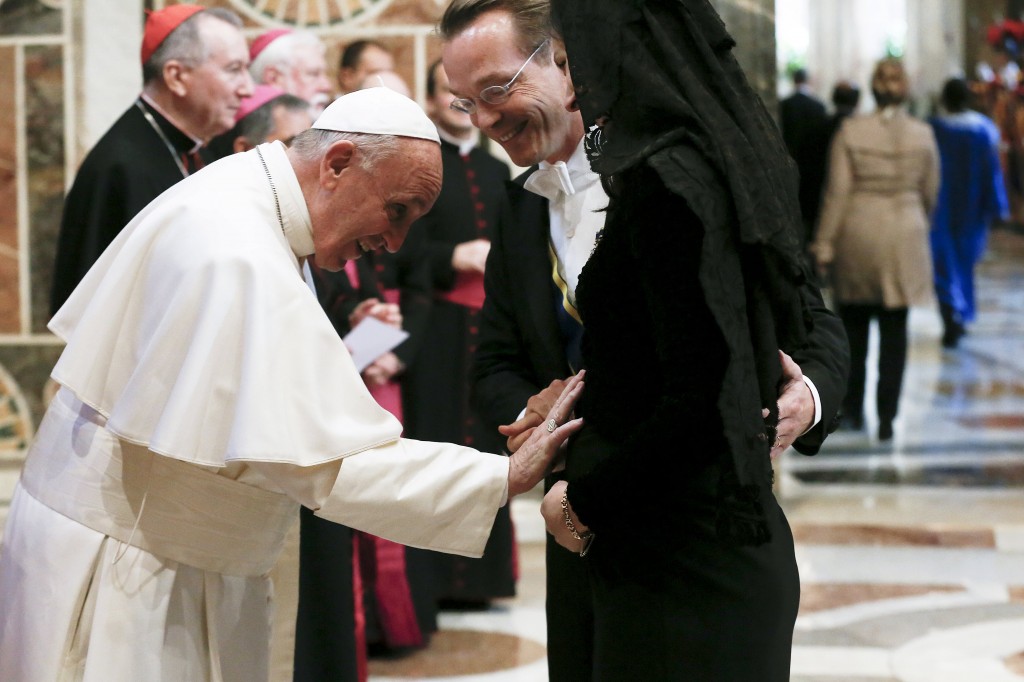
Pope Francis greets an ambassador and his wife during an audience with the diplomatic corps at the Vatican Jan.11. (CNS photo/Alessandro Bianchi, Reuters) See POPE-DIPLOMATS Jan. 11, 2015.
Happy Mother’s Day from Pope Francis and Amoris Laetitia!
On tenderness:
“Let us consider the moving words of Psalm 131. As in other biblical texts (e.g., Ex 4:22; Is 49:15; Ps 27:10), the union between the Lord and his faithful ones is expressed in terms of parental love. Here we see a delicate and tender intimacy between mother and child: the image is that of a babe sleeping in his mother’s arms after being nursed. As the Hebrew word gamûl suggests, the infant is now fed and clings to his mother, who takes him to her bosom. There is a closeness that is conscious and not simply biological” (no. 28).
On pregnancy and expecting a child:
“Pregnancy is a difficult but wonderful time. A mother joins with God to bring forth the miracle of a new life. Motherhood is the fruit of a ‘particular creative potential of the female body, directed to the conception and birth of a new human being’. Each woman shares in ‘the mystery of creation, which is renewed with each birth’. The Psalmist says: ‘You knit me together in my mother’s womb’ (Ps 139:13). Every child growing within the mother’s womb is part of the eternal loving plan of God the Father: ‘Before I formed you in the womb I knew you, and before you were born I consecrated you’ (Jer 1:5)… A pregnant woman can participate in God’s plan by dreaming of her child. “For nine months every mother and father dreams about their child… You can’t have a family without dreams. Once a family loses the ability to dream, children do not grow, love does not grow, life shrivels up and dies’ (nos. 168-169).
“Expectant mothers need to ask God for the wisdom fully to know their children and to accept them as they are” (no. 170).
“With great affection I urge all future mothers: keep happy and let nothing rob you of the interior joy of motherhood. Your child deserves your happiness. Don’t let fears, worries, other people’s comments or problems lessen your joy at being God’s means of bringing a new life to the world. Prepare yourself for the birth of your child, but without obsessing, and join in Mary’s song of joy: ‘My soul proclaims the greatness of the Lord and my spirit exults in God my Savior, for he has looked with favor on the lowliness of his servant’ (Lk 1:46-48). Try to experience this serene excitement amid all your many concerns, and ask the Lord to preserve your joy, so that you can pass it on to your child” (no. 171).
On a child’s need for a mother:
“We cannot ignore the need that children have for a mother’s presence, especially in the first months of life. Indeed, ‘the woman stands before the man as a mother, the subject of the new human life that is conceived and develops in her, and from her is born into the world’. The weakening of this maternal presence with its feminine qualities poses a grave risk to our world. I certainly value feminism, but one that does not demand uniformity or negate motherhood. For the grandeur of women includes all the rights derived from their inalienable human dignity but also from their feminine genius, which is essential to society. Their specifically feminine abilities – motherhood in particular – also grant duties, because womanhood also entails a specific mission in this world, a mission that society needs to protect and preserve for the good of all” (no. 173).
“A mother who watches over her child with tenderness and compassion helps him or her to grow in confidence and to experience that the world is a good and welcoming place. This helps the child to grow in self-esteem and, in turn, to develop a capacity for intimacy and empathy” (no. 175).
On society’s need for mothers:
“‘Mothers are the strongest antidote to the spread of self-centered individualism… It is they who testify to the beauty of life’. Certainly, ‘a society without mothers would be dehumanized, for mothers are always, even in the worst of times, witnesses to tenderness, dedication and moral strength. Mothers often communicate the deepest meaning of religious practice in the first prayers and acts of devotion that their children learn… Without mothers, not only would there be no new faithful, but the faith itself would lose a good part of its simple and profound warmth… Dear mothers: thank you! Thank you for what you are in your family and for what you give to the Church and the world’. (no. 174).
For more from Pope Francis on motherhood, read his catechesis from January 7, 2015!
Archive
AL Bootcamp: Week Two
 Welcome to week two! Hopefully you used your ‘patience’ and ‘kindness’ muscles well last week.
Welcome to week two! Hopefully you used your ‘patience’ and ‘kindness’ muscles well last week.
May 2
“Love is not jealous” (1 Cor 13:4).
Pope Francis: “Saint Paul goes on to reject as contrary to love an attitude expressed by the verb zelói – to be jealous or envious. This means that love has no room for discomfiture at another person’s good fortune (cf. Acts 7:9; 17:5)” (Amoris Laetitia, no. 95).
Sometimes things just seem so easy for other people. Today, when you are tempted to think that your spouse, children, or another relative just has an easier life than you do, remind yourself of how much God has done for you. Be content and pray for the grace to accept your own situation with a peaceful heart.
May 3
“You shall not covet your neighbor’s house. You shall not covet your neighbor’s wife, his male or female slave, his ox or donkey, or anything that belongs to your neighbor” (Ex 20:17).
Pope Francis: “True love values the other person’s achievements. It does not see him or her as a threat. It frees us from the sour taste of envy. It recognizes that everyone has different gifts and a unique path in life. So it strives to discover its own road to happiness, while allowing others to find theirs” (Amoris Laetitia, no. 95).
It is always difficult not to compare ourselves to other people, but that inevitably leads to sadness. Today, reflect upon the unique path that you have been on so far, and entrust yourself to God in confidence. Plan something fun with your family for next weekend so that you can appreciate your family as a gift.
May 4
“Love is not jealous” (1 Cor 13:4).
Pope Francis: “Love inspires a sincere esteem for every human being and the recognition of his or her own right to happiness. I love this person, and I see him or her with the eyes of God, who gives us everything ‘for our enjoyment’ (1 Tim 6:17). As a result, I feel a deep sense of happiness and peace” (Amoris Laetitia, no. 96).
Today, compliment members of your family, and try to choose something that you may never have said to them before. Think about what it means to see someone with “the eyes of God.”
May 5
“Love is not pompous, it is not inflated” (1 Cor 13:4).
Pope Francis: “The following word, perpereúetai, denotes vainglory, the need to be haughty, pedantic and somewhat pushy. Those who love not only refrain from speaking too much about themselves, but are focused on others; they do not need to be the center of attention. The word that comes next – physioútai – is similar, indicating that love is not arrogant. Literally, it means that we do not become ‘puffed up’ before others. It also points to something more subtle: an obsession with showing off and a loss of a sense of reality. Such people think that, because they are more ‘spiritual’ or ‘wise’, they are more important than they really are” (Amoris Laetitia, no. 97).
Do these words – haughty, pushy, puffed up – ever describe you? Make a concerted effort today to remember that even your good intentions and good deeds are gifts from God.
May 6
“Knowledge inflates with pride, but love builds up” (1 Cor 8:1).
Pope Francis: “Some think that they are important because they are more knowledgeable than others; they want to lord it over them. Yet what really makes us important is a love that understands, shows concern, and embraces the weak” (Amoris Laetitia, no. 97).
Is there a member of your family whom you pay less attention to because they aren’t as “smart” as you are? Reach out to them today with sincere interest in their life.
May 7
“But Jesus summoned them and said, ‘You know that the rulers of the Gentiles lord it over them, and the great ones make their authority over them felt. But it shall not be so among you. Rather, whoever wishes to be great among you shall be your servant; whoever wishes to be first among you shall be your slave’” (Mt 20:25-27).
Pope Francis: “It is important for Christians to show their love by the way they treat family members who are less knowledgeable about the faith, weak or less sure in their convictions… In family life, the logic of domination and competition about who is the most intelligent or powerful destroys love” (Amoris Laetitia, no. 98).
Families are always a “mixed bag” in terms of the practice of the faith. Think about the last time that you were with your extended family. Did you treat people kindly, even if they disagree with you or the Church? (This doesn’t mean watering down your love for your faith.) Are you approachable and gentle in your conversations?
Archive
The Prophecy of the Covenant of Man and Woman: Pope Francis
 (Picture taken of plush Francis in front of the Basilica of the National Shrine of the Immaculate Conception in Washington, D.C.)
(Picture taken of plush Francis in front of the Basilica of the National Shrine of the Immaculate Conception in Washington, D.C.)
Pope Francis’s trip to the United States in September centered on his appearance at the World Meeting of Families in Philadelphia. We finish with another quote from the closing homily at the Mass for the World Meeting of Families:
“We renew our faith in the word of the Lord which invites faithful families to this openness [to the gospel]. It invites all those who want to share the prophecy of the covenant of man and woman, which generates life and reveals God!”
Christians are people of hope! God will never abandon his people, his chosen family, regardless of how far we fall away from him. As we approach the Jubilee of Mercy, this will be a theme for the entire Church to reflect and meditate upon. Our God is more than simply “willing” to forgive us; He longs to do so. He longs for us to return home, contrite and aware of our brokenness, and He is ready to run out to us and clothe us again as his children.
This is what it means to be faithful: not to never fall, but to keep getting up, coming back to the Lord, converting our hearts every day in order to conform our lives to the word of God. To become a saint, whose life only makes sense in light of the gospel of Jesus.
A faithful family is not a “perfect” one in the eyes of the world, but one that is open to the word of God, and open to one another even in the wounds each person bears. It is one that struggles and goes through trials, is tested and sometimes fails, but returns again to the struggle.
For example, one could think about a “perfect” family as one in which the parents never yell at the children, and the children are always delighted to go to bed at the proper time, because they are obedient and trust their parents’ judgment. Has anyone ever met such a family? No. But have you ever seen a family where, after a long and arduous struggle on the part of the parents to get the children into bed (and stay there), where there may be some sharp words and exasperation, there is reading of a story, and a moment of prayer? A kiss and an “I love you” and a “tucking in” of the children?
Cardinal Tagle of Manila spoke of the family as the “Home for the Wounded Heart” at the World Meeting of Families and remarked on the way that family members, because they sin, hurt each other, but they also forgive and heal each other as well. They are a home for each other, where they know that no matter what, they will be loved and accepted, even if not understood or agreed with.
When he referred to prophesying in this quote, Pope Francis was reflecting on the passage of the Old Testament in which Moses wishes that all people may be prophets. The Holy Father likewise invited all of us to be open to the Gospel of the Family, and in doing so, to become prophets. The covenant between man and woman, which gives life and is an image of the Trinity, is a prophecy for our time. It is a message for the world: life is good and love is real. The word of God is still speaking to the hearts of men and women today, and affirming their desires for a permanent and fruitful love.
Archive
Faith Opens a Window: Pope Francis
 Photo Credit: Jeffrey Bruno
Photo Credit: Jeffrey Bruno
Pope Francis’s trip to the United States in September centered on his appearance at the World Meeting of Families in Philadelphia. The sixth quote in our series comes from Pope Francis’s homily for the conclusion of the World Meeting of Families on September 27:
“Faith opens a ‘window’ to the presence and working of the Spirit. It shows us that, like happiness, holiness is always tied to little gestures… Love is shown by little things.”
St. Therese of Lisieux is the patroness of world missions, despite being a cloistered Carmelite, who never left the convent. She shares this honor with St. Francis Xavier, who spent his life as a missionary and baptized countless people throughout Asia. On the surface, this seems to be a contradiction. St. Francis Xavier was the perfect picture of a missionary: bold and brave, traveling to foreign lands, living among the people. St. Therese was a plain French girl, who was so eager to enter the convent that she begged the pope to let her go there at the age of 15. She only lived until the age of 24, dying of tuberculosis. Why does she share the honor of patron of world missions? Why did missionary bishops ask for this?
In the short biography of St. Therese on the Vatican site, we can read why: “She considered it a special gift to receive the charge of accompanying two ‘missionary brothers’ with prayer and sacrifice. Seized by the love of Christ, her only Spouse, she penetrated ever more deeply into the mystery of the Church and became increasingly aware of her apostolic and missionary vocation to draw everyone in her path.” St. Therese was in the “mission field” through contemplative prayer and correspondence with missionaries.
This teaches us something about what holiness, and what being a missionary, really means. In her daily mortifications and sacrifices, young Therese offered to God her whole heart, mind, spirit and body. She had a great desire to be a missionary, even a martyr, but knew that that was not God’s will for her. Instead, she offered her myriad little, unnoticed actions for missionaries around the world. She demonstrated love in the “little things,” just as the pope spoke about at the world meeting.
Alice von Hildebrand wrote a personal story about this in a letter to a newlywed woman who was not sure that the “little things” really mattered in marriage. Von Hildebrand strongly disagreed. She wrote,
“Early in our marriage, I noticed he [Dietrich] would always leave the soap swimming in a small pool of water. It would slow degenerate into an unattractive, slimy goo—something I found unappealing. I drew it to his attention. From that day on, he made a point of drying the soap after each use—to such an extent that I couldn’t tell from the ‘soap testimony’ whether he had washed himself or not… I was so moved by this, that to this day I feel a wave of loving gratitude for this small but significant gesture of love.
My husband was a great lover. And because he was one, he managed to relate the smallest things to love and was willing to change to please his beloved in all legitimate things. This characteristic is typical of great love” (By Love Refined).
Family life is rife with opportunities to show love in little ways, and to find the Holy Spirit working there—if we look with the eyes of faith.
Let us all seek to be great lovers of God!
Archive
A Culture of the Temporary: Pope Francis
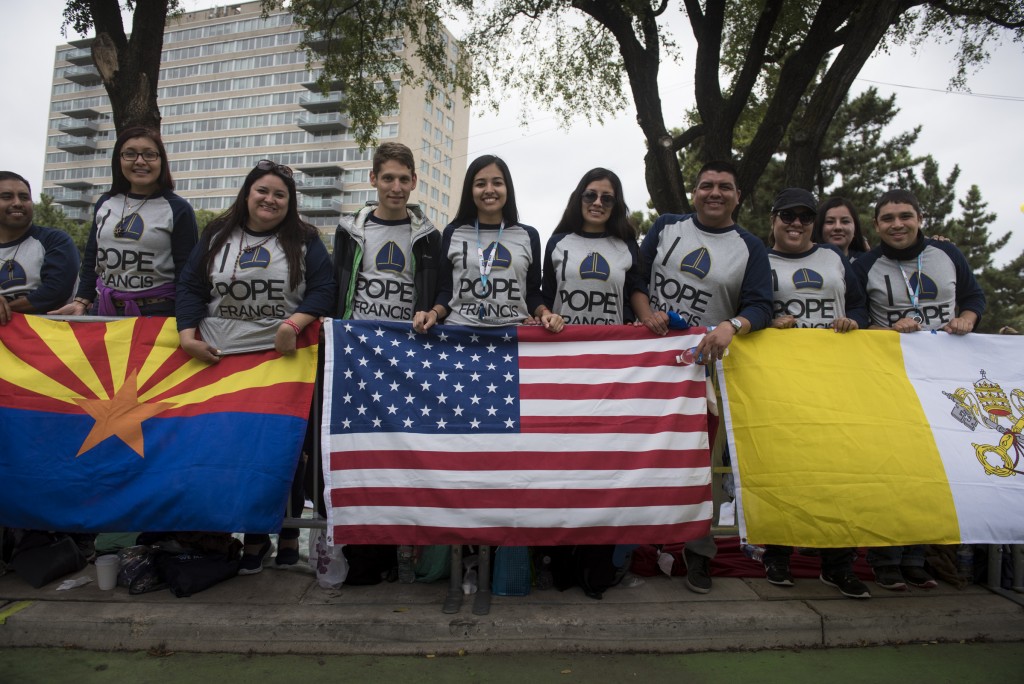 Photo credit: Jeffrey Bruno
Photo credit: Jeffrey Bruno
Pope Francis at the World Meeting of Families: Seven Great Quotes
Pope Francis’s trip to the United States in September centered on his appearance at the World Meeting of Families in Philadelphia. Here is the fifth quote, from the meeting with bishops on September 26:
“Today’s culture seems to encourage people not to bond with anything or anyone, not to trust.”
As noted last week, fidelity as a virtue is no longer upheld in the culture. This is one contributing factor to the phenomenon that Pope Francis points to in today’s quote: young people are marrying at a far lower rate now than in the past. The capacity to bond with another person, to commit to them, and to entrust yourself to them, seem to be diminishing. The culture does not encourage qualities like trust, listening, patience, vulnerability, or commitment, all of which are necessary for marriage.
The fact of widespread divorce has resulted in many adult children who do not have personal experience or support of parents who have remained faithful to their spouses. They are understandably more anxious about making a lifetime commitment, because they fear that they, too, will “fail”.
Even if their parents are married, many young people buy into the lie that they need to “try the other person out” sexually before they make a commitment. Ironically, engaging in premarital sex with multiple partners actually diminishes the physical and chemical bond that forms through the sexual act, thus diminishing the likelihood of commitment rather than increasing it. This attitude toward sex plays directly into what Pope Francis calls the “throwaway culture.” Instead of seeing another person as a gift, a person who should be loved and never used, a man or woman sees the other as a possibility for “fun” or “release” without regard to their dignity or to the future.
Young adults often turn to cohabitation as a way of “easing in” to a commitment, which turns out to be counter-productive, as these relationships are less stable by design. Accustomed to living together without marriage, these couples also appear less likely to stay married when trouble comes. Researcher Brad Wilcox concludes that living in a cohabitating household is now the largest problem for children in America.
Social media and other forms of technology also seem to feed into a culture where there are no strong bonds between people. As MIT researcher Sherry Turkle notes, “Once we remove ourselves from the flow of physical, messy, untidy life — and both robotics and networked life do that — we become less willing to get out there and take a chance” (Alone Together). Connections through technological means are more frequent but less deep, and almost never require sacrifice. It is no wonder, then, that young people have a harder time choosing to commit to one person for the rest of their life, when they have not practiced faithful, sacrificial friendship.
Marriage, then, is like a revolt against the culture of the temporary. As Pope Francis said at World Youth Day in 2013: “I ask you, instead, to be revolutionaries, to swim against the tide; yes, I am asking you to rebel against this culture that sees everything as temporary and that ultimately believes that you are incapable of responsibility, that you are incapable of true love.”
Archive
Civil marriage and the Sacrament: Pope Francis
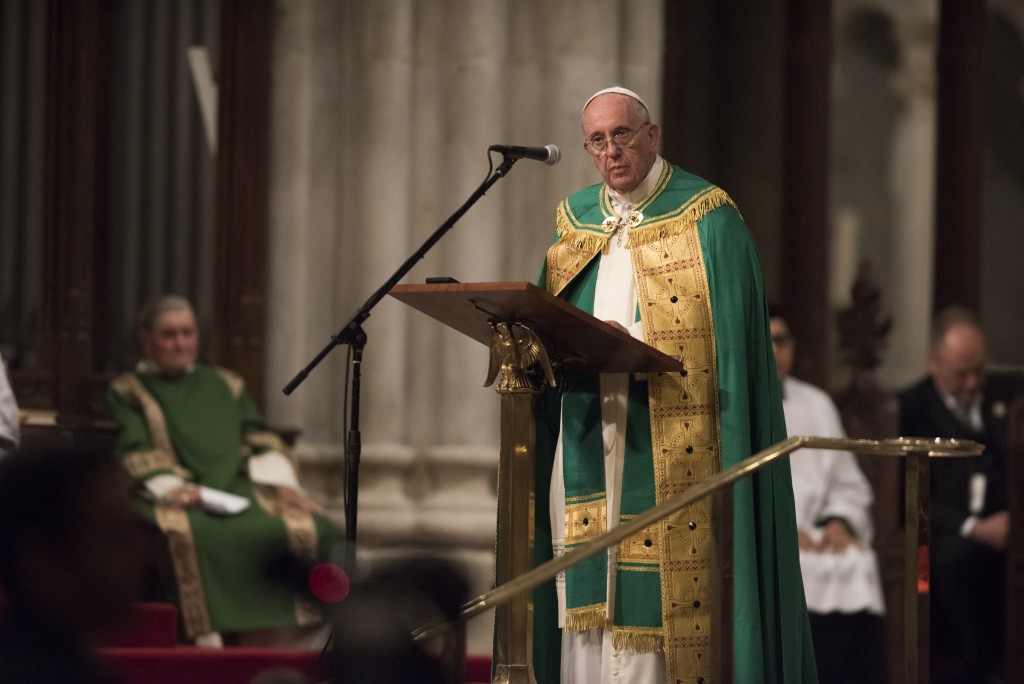 Photo credit: Jeffrey Bruno
Photo credit: Jeffrey Bruno
Pope Francis’s trip to the United States in September centered on his appearance at the World Meeting of Families in Philadelphia. Here is the fourth quote in the series, from the meeting with bishops on September 26:
“Until recently, we lived in a social context where the similarities between the civil institution of marriage and the Christian sacrament were considerable and shared. The two were interrelated and mutually supportive. This is no longer the case.”
Pope Francis acknowledges the rift that has opened up between the civil and religious conception of what marriage is. This rift did not begin on June 26th, 2015, but rather has its roots in the so-called “sexual revolution.”
Think about the essentials of marriage, according to Catholic teaching: unity, indissolubility, and procreation. The dominant American culture and society have rejected these truths systematically for about the last 50 years. Widespread individualism, adultery, “no-fault” divorce, contraception, sterilization, and assisted reproductive technologies have whittled away at the public consciousness of what marriage and procreation is or is meant to be. Now, with the redefinition of marriage, America has continued in this path. And now the Catholic Church is called to proclaim even more courageously the truth about marriage, family and the human person in a hostile climate.
Why does it matter what the culture does, as long as the Church knows what marriage is?
Law and culture are teachers. Mass media and all of the messages that come from radio, TV, and film have an effect on the formation of our minds and consciences. This is not only a conscious process but largely an unconscious one. Messages from the culture become like the air we breathe: not noticed or observed, simply accepted. No matter how strong your individual family “unit” is, it is affected by the world around it. Let’s look at fidelity as a concrete example.
A culture where promises are honored strengthens marriages. Married couples, especially in hard times, benefit greatly from the example of other married couples who made it through similar experiences. The divorce of someone’s parents, even if it happens when he or she is an adult, affects the child’s marriage. Because her parents are divorced, a woman cannot rely on her own mother or father to assure her that, “It will be okay, just take it one day at a time.”
“Dinner with Friends,” a play by Donald Margulies, centers on two married couples with children. One of the marriages breaks up, and this deeply affects the other marriage, even though the other couple stays together. There’s a sense that the couple who broke up did not break faith only with each other, but also with their friends.
The agrarian author, Wendell Berry, speaks of the promise of fidelity in marriage being made not only to one’s own wife, but to every other woman. “The forsaking of all others is a keeping of faith, not just with the chosen one, but with the ones forsaken. The marriage vow unites not just a woman and a man with each other; it unites each of them with the community in a vow of sexual responsibility toward all the others” (“The Body and the Earth”). If Jack promises to be faithful to Jill, not only should Jill be able to be secure in that promise, but Jane, Anne, and Mary should also be secure that Jack will never look at them as a possible partner. One promise means freedom for everyone.
In an age where there are businesses designed to help spouses cheat on their partners, and where many divorces occur because of adultery, everyone is naturally more insecure about trusting the fidelity of married people. As Pope Francis noted in a recent general audience, being true to your word used to be considered a point of honor: “And, speaking of fidelity, there comes to mind what our elderly, what our grandparents tell us about ‘those times when an agreement was made, a shaking of hands was sufficient, because there was fidelity in promises’ (October 21, 2015). Our culture today does not uphold fidelity, and therefore fidelity is harder to practice. This is just one example of what Pope Francis was pointing to in his speech to the bishops in Philadelphia.
Archive
The family is the fundamental locus: Pope Francis
Pope Francis at the World Meeting of Families: Seven Great Quotes
Pope Francis’s trip to the United States in September centered on his appearance at the World Meeting of Families in Philadelphia. Here is the third quote in our series, from the meeting with bishops in Philadelphia.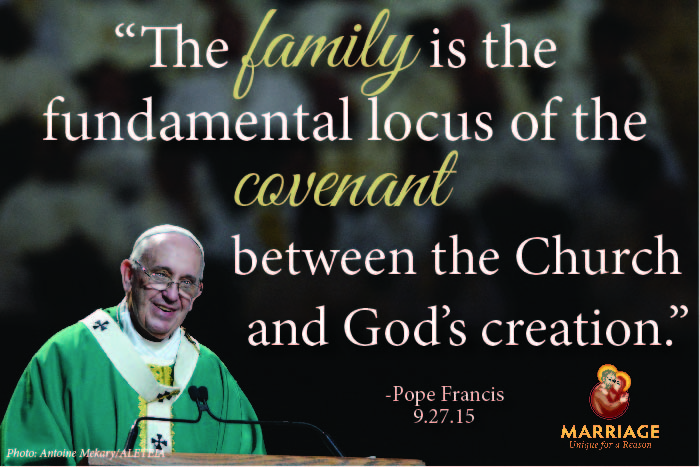
“The family is the fundamental locus of the covenant between the Church and God’s creation.”
“Locus” is not a word that is often used in conversation. According to the Merriam- Webster Dictionary, locus means: “the place where something is situated or occurs; a center of activity, attention, or concentration.” You could say that Philadelphia was a the locus of the pope’s trip to the United States; despite the other cities included in the trip, the Mass at the end of the World Meeting of Families was its main focus.
“Covenant” is a word with a long tradition in the Church. It means the exchange of persons; not a contract in which each person agrees to do something, but a promise to be someone. “I will be your God and you will be my people.” “I take you to be my wife” or “I take you to be my husband.” God makes a covenant with his people in creating them, and renews this covenant throughout the Old Testament as he chooses a people (the Jews) to be his own. The definitive covenant occurs when Jesus Christ offers himself for the sins of the world.
Now, looking at this quote from Pope Francis’s meeting with the Bishops in Philadelphia, we could read it as: the family is the primary place where God and the Church meet and give themselves to each other. This underscores the vital importance of the family. It is the ordinary means by which God enters into a person’s life. A strong family that brings children up to know, love, and serve the Lord is so important for the life of the Church that it is “fundamental.” While God’s grace can reach persons anywhere and anytime, it is the family that He ordained for that purpose. As the Holy Father said in his speech at the festival of families, “God always knocks at the door of hearts. He likes to do this. It comes from His heart. But, do you know what He likes best? To knock on the doors of families and find families that are united, to find families that love each other, to find the families that bring up their children and educate them and help them to keep going forward and that create a society of goodness, of truth, and of beauty.”
God desires to give his life and his grace to every human person, from the very beginning of their existence, which occurs within another human person. In the womb, God blesses a child (c.f. Ps 139:13). The Holy Spirit is present all along the way— He brings a man and a woman together in love, unites them in marriage, gives life through their act of love, strengthens a woman to give birth, and animates the continued growth of the family. He is a continual source of life for a man and woman united in sacramental marriage.
The family is also the place of the cross: how could it be otherwise, if it is the “locus of the covenant” which was wrought in the blood of Jesus? Infertility, disease, tragedy, pain and sin also enter into human experience through the family. God and the family meet and give themselves to each other through suffering as well as joy. This is a fundamental truth proclaimed by the Holy Father in September.
Archive
The Good, True, and Beautiful at the World Meeting of Families
Pope Francis at the World Meeting of Families: Seven Great Quotes
Pope Francis’s trip to the United States in September centered on his appearance at the World Meeting of Families in Philadelphia. Staff will write reflections on seven quotes from his visit.
From the Festival of Families: “All of the love that God has in Himself, all the beauty that God has in Himself, all the truth that God has in Himself, He gives to the family.”
Classical philosophers (think Socrates, Plato, Aristotle, etc.) refer to beauty, truth and goodness as the transcendental properties of being; aspects of being (or existence) that “transcend” or “go beyond” the thing that exists. God is all-in-all; He is the perfection of beauty, truth and goodness. Since He is Being (“I AM”), these attributes of being originate in God.
Let’s put this more simply. There’s the usual way we talk about goodness as a quality of a person: “Oh, she’s so good!” we may say, when we hear of a woman doing something charitable in our community. When we see obvious goodness— in Mother Theresa, for example—we see God within that action or person. But the goodness we’re talking about here, goodness as an attribute of being goes further. It means that the pure existence of something (or someone); that it is, is good. To love is to say to someone, “It is good that you exist,” regardless of whether that someone is annoying you at the time. A person does not have to do anything, in this case, to be good. The fact that they exist is the good. Think of babies. They are (or should be) loved because they are, not because they do anything special. This is a glimpse of God, who loves us into being and because He loves us, we are, we exist. As the pope said here, God gives the family this kind of love, this kind of total acceptance and goodness.
Secondly, beautiful things can draw us closer to God who is Beauty. Nature, art, music, etc. can all draw us out of ourselves (“ecstasy”) and lead us to seek the origin of the beauty we experience. Once again, beauty inheres (or is “stuck to”) anything that exists. Even a hairy spider (the author’s personal hatred) is beautiful in that it exists. God wills it into being. At the Festival of Families, Pope Francis said that God, who is love, gives to the family His own beauty. When you see a picture of a family that encompasses numerous generations, it is hard to deny this.
Lastly, if something is true, that means that it corresponds to reality; if I say, “There are three apples” and there really are three apples, then I speak the truth, and in speaking the truth about the apples, my mind is “in tune,” if you will, with God. God and I see the same thing (three apples). The family corresponds to the truth when it lives according to God’s laws (which are simply an expression of what reality is). What a family is, a community of life and love, is true.
How can you see the goodness, beauty and truth of your family today?
Archive
The Dignity of Persons and Marriage
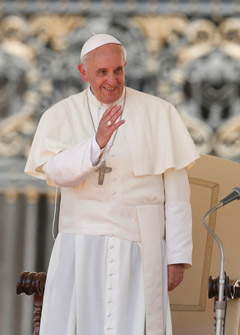 Archbishop Sample from Portland, Oregon, reflected recently on the famous words of Pope Francis, “Who am I to judge?” in light of its context. These words are usually taken out-of-context to imply that the Holy Father sees nothing wrong with sexual acts between two persons of the same sex. Instead, “These words of Pope Francis were delivered in response to a very specific question about a particular individual who was accused of inappropriate homosexual behavior in the past.”
Archbishop Sample from Portland, Oregon, reflected recently on the famous words of Pope Francis, “Who am I to judge?” in light of its context. These words are usually taken out-of-context to imply that the Holy Father sees nothing wrong with sexual acts between two persons of the same sex. Instead, “These words of Pope Francis were delivered in response to a very specific question about a particular individual who was accused of inappropriate homosexual behavior in the past.”
Bishop Sample included the pope’s whole quote: “I see that many times in the Church people search for ‘sins from youth’, for example, and then publish them. They are not crimes, right? No, sins. But if a person, whether it be a lay person, a priest or a religious sister, commits a sin and then converts, the Lord forgives, and when the Lord forgives, the Lord forgets and this is very important for our lives. When we confess our sins and we truly say, ‘I have sinned in this’, the Lord forgets, and so we have no right not to forget, because otherwise we would run the risk of the Lord not forgetting our sins. That is a danger. This is important: a theology of sin…If someone is gay and is searching for the Lord and has good will, then who am I to judge him?… The problem is not having this tendency, no, we must be brothers and sisters to one another…”
Indeed, as Bishop Sample points out, Pope Francis is bringing out what the Catholic Church has always taught: that our God is a God of mercy. He then goes on to highlight some of Pope Francis’s other words which show that he is certainly not an advocate for so-called same-sex “marriage.”
Read the full text here.
Archive
Evangelii Gaudium: Mary, Mother of Evangelization
 Lessons from Evangelii Gaudium #20
Lessons from Evangelii Gaudium #20
Pope Francis’s Apostolic Exhortation on the proclamation of the Gospel in today’s world, Evangelii Gaudium or “The Joy of the Gospel,” has many points that are relevant to the work of Marriage: Unique for a Reason. This series will explore some of these themes and apply Pope Francis’s words to the culture of marriage and family in the United States.
Mary, Mother of Evangelization
Pope Francis ends his apostolic exhortation by turning to Mary, who is our model and our help in evangelization. If we reflect on Christ’s dying words in the Gospel of John, “Here is your mother” (Jn 19:27), we see that in this most important moment, in “the supreme hour of the new creation,” Christ turns our attention to Mary (no.285). He offers us his mother to be our own, as “an icon of womanhood” to intimately accompany the Church, which includes each one of us (no. 285).
The Holy Father reminds us of the myriad roles that Mary plays in the life of the Church. She is the “handmaid of the Father who sings his praises…the friend who is ever concerned that wine not be lacking gin our lives…the woman whose heart was pierced by a sword…a sign of hope…the missionary who draws near to us…a true mother” (no. 286). In these many ways and more, Mary is with each of us, sharing our history, struggles, and our mission. What a wonderful gift Christ has given us! Her maternal comfort is a wellspring of strength and hope for all who are weary and suffering.
As the one who allowed herself to be completely open to and guided by the Holy Spirit, Mary is our model of perfect faith; she is “the Mother of the Church which evangelizes” (284). She accompanies us as we enter more deeply into the mystery of faith—a journey often riddled with moments of “aridity, darkness, and even fatigue” (no. 287). She herself, Pope Francis tells us, often experienced these things, as she “lived in intimacy with the mystery of her Son, and went forward in her pilgrimage of faith” (no. 287). As we strive to live in that same intimacy, she offers us the comfort of her maternal presence especially through the moments of darkness and uncertainty.
In gratitude for the gift of His mother that Christ gave us, we must keep love and reverence for Mary alive in our homes, without whom “we could never truly understand the spirit of the new evangelization” (no. 284). We must look to her for the form that evangelization should take, especially within our family lives. She has shown us that justice and tenderness, contemplation and work, must always be held together. When we live in this way, looking to our Mother for guidance, our homes with the entire Church can help to open the way “to the birth of a new world” (288).
Archive
Evangelii Gaudium: Intercessory Prayer
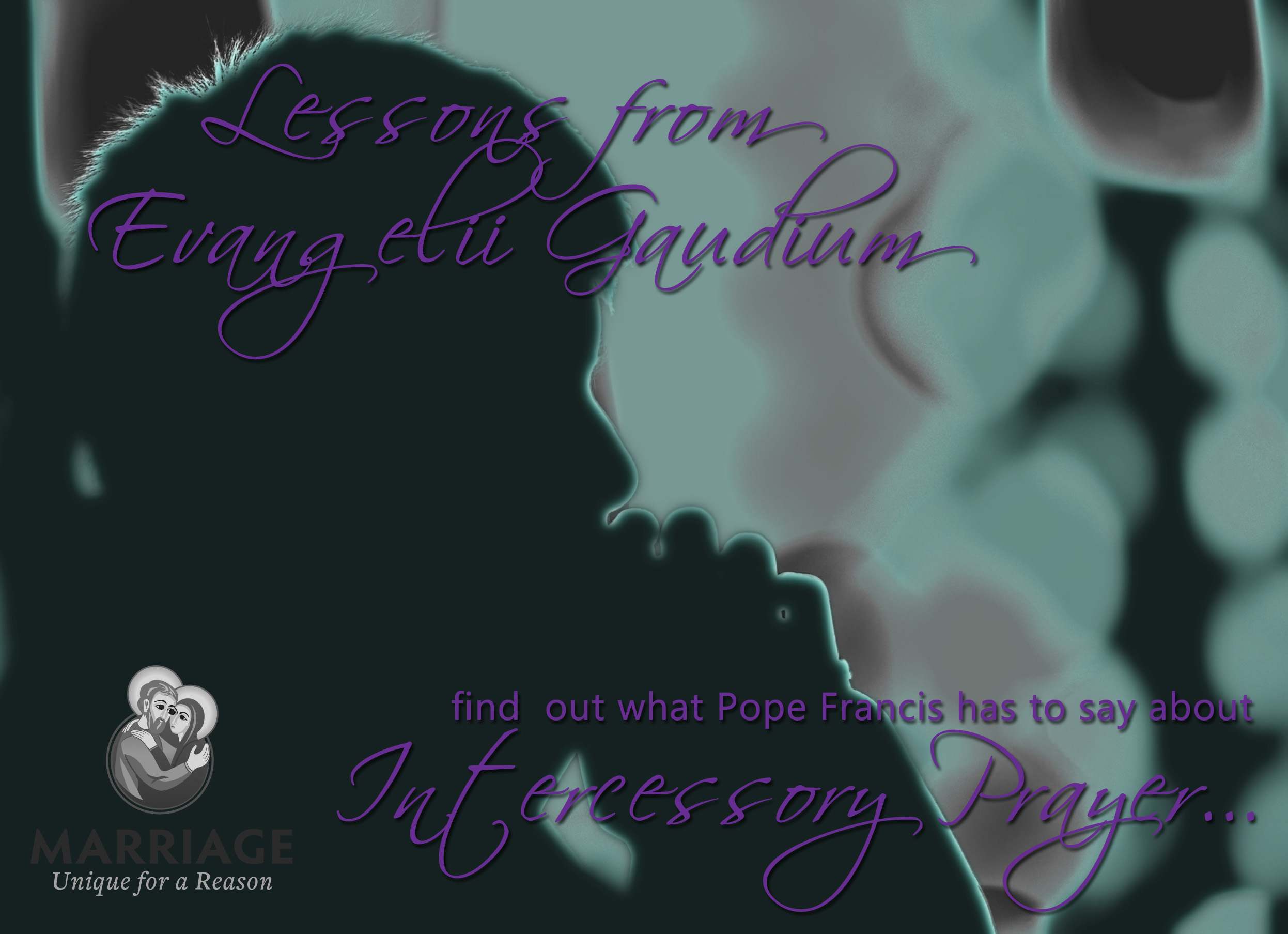 Lessons from Evangelii Gaudium #19
Lessons from Evangelii Gaudium #19
Pope Francis’s Apostolic Exhortation on the proclamation of the Gospel in today’s world, Evangelii Gaudium or “The Joy of the Gospel,” has many points that are relevant to the work of Marriage: Unique for a Reason. This series will explore some of these themes and apply Pope Francis’s words to the culture of marriage and family in the United States.
Intercessory Prayer (281-283)
While there are many ways to live out our prayer lives, Pope Francis calls our attention to one particular form of prayer: Intercession. The Catechism of the Catholic Church defines Intercessory prayer as “a prayer of petition which leads us to pray as Jesus did.” Though he is the “one intercessor with the Father on behalf of all men,” we can be united with him in this form of prayer (CCC, 2634).
For a concrete example of intercessory prayer, the Holy Father points us to St. Paul, who shows us that prayer is “full of people” in its concerns (no. 281). Paul tells the Philippians, “I constantly pray with you in every one of my prayers for all of you…because I hold you in my heart” (Phil 1:4, 7). Authentic intercessory prayer is marked by an attitude of attentiveness and gratitude that recognizes God’s work in the lives of others (no. 282). While intercession can often be misunderstood as “suspicious, negative and despairing,” Pope Francis teaches instead that, “when evangelizers rise from prayer, their hearts are more open; freed from self-absorption,…desirous of doing good and sharing their lives with others” (no. 282).
Because Jesus Christ is the true intercessor, our union with Him in prayer is a special way to gain access to the heart of the Father. And yet our prayer must always be offered in humility. When we intercede for others, “God’s heart is touched”—our prayer has true power—and “yet in reality he is always there first” (no.283). Intercessory prayer is not about what we want or what others want; instead it brings to light the love and work of God that is always already present there.
Our homes should be a fruitful place where this prayerful openness, gratitude, and concern for others abides. As a family, foster awareness of the needs of those around you—at work, at school, in the neighborhood, and around the world. Come together to pray for them, holding them in your heart, as St. Paul did. Then be sure to discuss the ways in which you notice God working. This is a wonderful way to unite as a family to Christ, to turn towards others, and to become ever more aware of God’s constant, loving presence.
Archive
Prayer and Encounter: Evangelii Gaudium
Lessons from Evangelii Gaudium #18
Pope Francis’s Apostolic Exhortation on the proclamation of the Gospel in today’s world, Evangelii Gaudium or “The Joy of the Gospel,” has many points that are relevant to the work of Marriage: Unique for a Reason. This series will explore some of these themes and apply Pope Francis’s words to the culture of marriage and family in the United States.
Prayer and Personal Encounter (262-267)
Our call to evangelization flows from the love we have received in our personal encounter with Christ; without this love, our attempts to evangelize would be empty and unconvincing. Unless we fill our lives with “prolonged moments of adoration, of prayerful encounter with the word, of sincere conversation with the Lord, our work easily becomes meaningless; we lose energy as a result of weariness and difficulties, and our fervor dies out” (no. 262). The Holy Father invites us to constantly beg the Lord to open and enliven our hearts by his grace. It is through our dynamic joy from having received His love that we can best relay the gospel message to others.
Pope Francis reminds us that while time set aside for prayer is necessary nourishment for our work, we must not fall into a habit of “individualistic spirituality” that draws us further away from our mission to others. Though we receive anew our life and joy from our daily encounters with the love of Christ, we can’t stop short of turning toward others to give away that same love.
The enthusiasm of our mission is strengthened by our conviction that Christ responds to the deepest longing of our hearts—and that he is likewise the answer to the deepest needs of all people. This conviction must be kept alive through our own understanding “from personal experience that it is not the same thing to have known Jesus as not to have known him, not the same thing to walk with him as to walk blindly, not the same thing to hear his word as not to know it, and not the same thing to contemplate him, to worship him, to find our peace in him, as not to” (no. 266). If we are not personally aware of the presence of Christ in our life and the difference that it makes, if we try to evangelize by our own means, our passion and commitment will be drowned out by our human weakness and complacency.
Like Christ, our greatest motivation is the glory of the Father. If we are to remain vigorous in evangelizing—especially in the face of the many cultural and political obstacles of our world—we must strive for union with Christ, so that we may “seek what he seeks and…love what he loves” (no 267).
We must never let our commitment to work distract us from the ever-deepening encounter with Christ that first called us to serve Him. In order to foster personal awareness of Christ’s presence within family life, set aside time each day for quiet, receptive prayer. Afterwards, come together again in conversation as a family. This simple practice can serve as a model of our call to first receive love from Christ in order to give away that same love to everyone we encounter.
Archive
Religious Freedom: Evangelii Gaudium
Lessons from Evangelii Gaudium #17
Pope Francis’s Apostolic Exhortation on the proclamation of the Gospel in today’s world, Evangelii Gaudium or “The Joy of the Gospel,” has many points that are relevant to the work of Marriage: Unique for a Reason. This series will explore some of these themes and apply Pope Francis’s words to the culture of marriage and family in the United States.
Religious Freedom (nos. 255-258)
The Church recognizes the importance of religious freedom for maintaining a healthy social dialogue and an atmosphere of peace; but what, exactly, do we mean by peace? Peace is not an absence of difference, but a respectful harmony within a healthy pluralism of beliefs, which “respects differences and values them as such” (no. 255). Attempts to privatize religion as an individual matter of conscience that must stay behind church doors reflect “a new form of discrimination and authoritarianism,” rather than the progression of religious freedom (no. 255). Because our religious beliefs are meant to be embodied and manifested in our relationships and work in the public sphere, this kind of delegation does not grant us true freedom.
This lack of freedom is particularly prevalent in the intellectual and cultural realms. Pope Francis sees the modern tendency to disregard all religious thought as an attack not just on religious freedom, but also on reason. This discriminatory dismissal serves a “certain rationalism” that has largely dominated our culture, but is actually opposed to reason in the fullest sense. To ignore the history of thought that has arisen within a religious context is an impediment to, rather than a triumph of reason. This is evident in the narrow-minded views of most media representations of religion. When these “crude and superficial generalizations” become the norm, we lose a wealth of human understanding that the context of faith has developed.
To combat this rationalism, the Holy Father encourages interreligious dialogue, including that between believers and those who—though they don’t identify themselves with any religious tradition—“sincerely seek the truth, goodness and beauty which we believe have their highest expression and source in God” (no. 257). Such dialogue—especially in the realms of ethics, arts and sciences—can help to bring about peace through a mutual respect for the dignity of life and a mutual search for transcendent meaning.
Dialogue that respects and values difference should begin in the home! As we face increasing opposition in the public square, it is ever more important that our families be a place of openness and dialogue. Family members with differing beliefs must be accepted and loved, and this respect will be a model for children to follow. The peace within a family that appreciates the uniqueness of each member can serve as the starting point for peace in society.
Archive
The Common Good, II: Evangelii Gaudium
Lessons from Evangelii Gaudium #16
Pope Francis’s Apostolic Exhortation on the proclamation of the Gospel in today’s world, Evangelii Gaudium or “The Joy of the Gospel,” has many points that are relevant to the work of Marriage: Unique for a Reason. This series will explore some of these themes and apply Pope Francis’s words to the culture of marriage and family in the United States.
The Common Good and Peace in Society, Part II (nos. 231-237)
The next two principles Pope Francis writes about in this section on the common good are:
- Realities are more important than ideas
- The whole is greater than the part
Pope Francis reminds us in the first part that ideas and reality must be in constant dialogue with one another. “It is dangerous to dwell in the realm of words alone, of images and rhetoric,” he writes (no. 231). One calls to mind the image of an abstract philosopher, musing to himself on the joys and trials of married life while his wife, with frizzled hair and angry expression, changes a diaper on the floor of the kitchen while a meal she prepared is cooking on the stove and someone has come to the door. This is a caricature, of course, but this seems to be what the pope is talking about: when the words do not become flesh.
“What calls us to action are realities illumined by reason” (no. 232). When we are engaged in seeing reality with all the benefits of contemplating truth, we strive to live differently. The picture changes, for example, into one of a father embracing his wife on his way to change the diaper. It is the Incarnation that shows us that words alone are not enough: the Word was made flesh!
The second principle, Pope Francis writes, means that we must pay attention to both of the worlds we live in: the global context and our local communities. He uses the analogy of a polyhedron, which is both distinct and unified. There is “a place for everyone” and each person maintains his or her individuality while becoming part of a larger whole.
In marriage, while the two become “one flesh,” they also maintain their own identities. In fact, the love of the other should help each to become more fully him- or herself. Likewise, each child that is given to a family is a unique human person. They should be encouraged in their interests, even if no one in the family shares them, and be educated to see their differences as strengths. When the family is united in difference, they reveal the truth that “the whole is greater than the parts.”
Archive
The Common Good and Peace in Society: Evangelii Gaudium
Lessons from Evangelii Gaudium #15
Pope Francis’s Apostolic Exhortation on the proclamation of the Gospel in today’s world, Evangelii Gaudium or “The Joy of the Gospel,” has many points that are relevant to the work of Marriage: Unique for a Reason. This series will explore some of these themes and apply Pope Francis’s words to the culture of marriage and family in the United States.
The Common Good and Peace in Society (nos. 217-230)
This section of Evangelii Gaudium is divided into four principles; we will look at the first two here.
First, Pope Francis writes, “Time is greater than space” (no. 222). He reminds the Church not to be “obsessed with immediate results” (no. 223). He counsels patient endurance in difficult situations or when our plans must change. He wants us to allow time the priority, even in evangelization.
This clearly relates to family life, especially when a child chooses to leave the faith or the family for one reason or another. The Holy Father reminds us not to give up on anyone, and to remember to trust in God’s saving work through time.
Next, the pope writes that, “Unity prevails over conflict” (no. 226). He says, “Conflict cannot be ignored or concealed. It has to be faced”(no. 226). How many families need to learn this lesson? How easy it may seem to ignore our differences, to sweep them under the rug in order to maintain a semblance of unity. On the other hand, how easy to be blinded by conflict to all the other things we have in common. Instead, we can strive to be “great persons who are willing to go beyond the surface of the conflict and to see others in their deepest dignity”(no. 228).
We learn to do this in the family, as the Pope highlighted in his 2015 Message for World Communications Day. There, he writes, “More than anywhere else, the family is where we daily experience our own limits and those of others, the problems great and small entailed in living peacefully with others. A perfect family does not exist. We should not be fearful of imperfections, weakness or even conflict, but rather learn how to deal with them constructively. The family, where we keep loving one another despite our limits and sins, thus becomes a school of forgiveness.” In the family, we love one another even when we do not get along. This can teach us how to approach people outside the family as well: as persons who are more than their opinions on a given topic. Even on the most contentious and serious issues, those on the “other side” are persons, loved by God, and must be acknowledged as such. “Unity brought by the Spirit can harmonize every diversity,” the pope writes (no. 230). By lovingly taking all family members where they are, we can realize this truth in our own lives.
